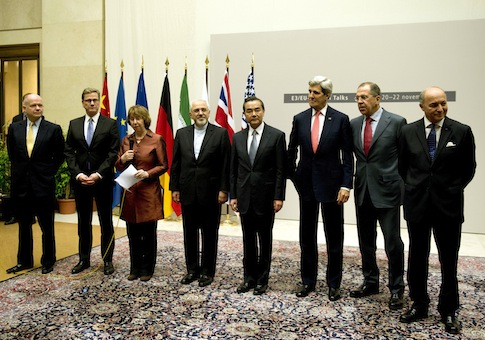The final details of a nuclear agreement signed over the weekend between Iran and Western nations will not actually go into effect until further negotiations take place at a later date, according to a senior administration official and sources on Capitol Hill.
Even as Iran and the P5+1 announced late Saturday night that they had reached a six-month interim deal that curbs Iran’s nuclear program while giving Tehran the ability to continue some uranium enrichment activities, it is now clear that the six-month freeze will not go into effect until the P5+1 negotiators and Iran agree to a final plan to implement the interim agreement.
"Technical details to implement the Joint Plan of Action must be finalized before the terms of the Plan begin," a senior administration official told the Washington Free Beacon on Monday. "The P5+1 and Iran are working on what the timeframe is."
Congressional sources confirmed that the freeze would not actually begin until the parties agree to sign a supplemental agreement that puts the framework into effect.
That means the six-month clock referenced by the administration and media has not yet started. Iran can continue its most controversial nuclear activities as negotiators work to finalize the interim deal reached over the weekend.
"There is no deal in place," a senior congressional aide briefed on the deal told the Free Beacon. "The agreement signed this weekend was not an actual agreement—it was a list of ideas with no way to implement them."
The source said that all sides are in a holding pattern of sorts until final details can be worked out.
"The White House told us that it could take weeks to negotiate another agreement to implement this framework—but until then, Iran's nuclear program runs full steam ahead," the source said.
It is unclear when negotiations on a final interim deal will take place and be completed.
Critics say that Congress’ hands will be tied from passing additional sanctions as negotiators continue efforts to finalize the interim deal.
Iranian Foreign Minister Javad Zarif said the first phase of the deal could take effect by the end of the year.
"In the coming weeks—by the end of the Christian year—we will begin the programme for the first phase," Zarif said in an interview, according to Reuters.
Under the draft agreement reached late Saturday, the United States agreed to suspend "certain sanctions on gold and precious metals, Iran’s auto sector, and Iran’s petrochemical exports, potentially providing Iran approximately $1.5 billion in revenue," according to a fact sheet provided by the White House.
Iran could earn another $4.2 billion in oil revenue under the deal.
Another "$400 million in governmental tuition assistance" could also be "transferred from restricted Iranian funds directly to recognized educational institutions in third countries to defray the tuition costs of Iranian students," according to the White House.
